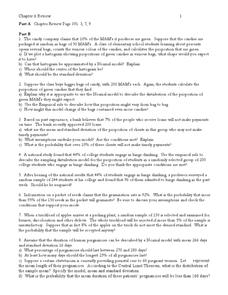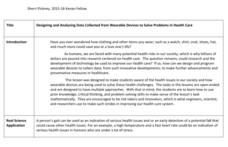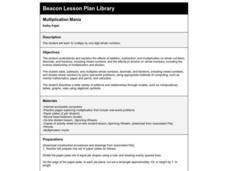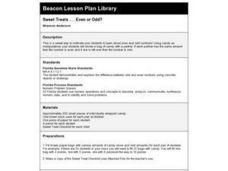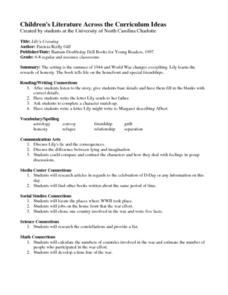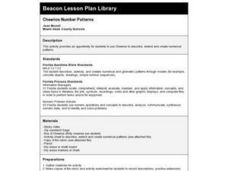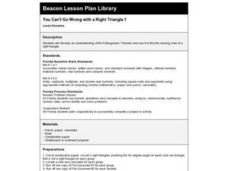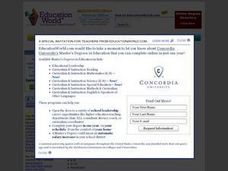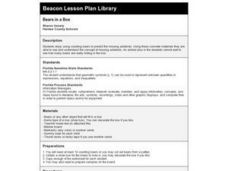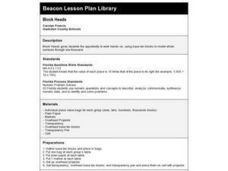Curated OER
Perceived Risks
Learners rank a list of everyday risks to compare with classmates. They rate each risk on both its ability to be controlled and its observability in the environment. Results are graphed.
Curated OER
Connecting Algebra and Geometry Through Coordinates
This unit on connecting algebra and geometry covers a number of topics including worksheets on the distance formula, finding the perimeter and area of polynomials, the slope formula, parallel and perpendicular lines, parallelograms,...
Curated OER
Random Probability
In this statistics and probability worksheet, young statisticians solve and complete 13 different problems related to probability, percentages, and normal distributions. They consider data models, assumptions about the models, and find...
Kenan Fellows
Designing and Analyzing Data Collected from Wearable Devices to Solve Problems in Health Care
Wearable devices have become more the norm than the exception. Learners analyze data from a sample device with a regression analysis in a helpful hands-on lesson. Their focus is to determine if there is a connection between temperature...
Curated OER
Gullah Activities
Students study the Gullah culture by watching a video about Gullah, Gullah Island. They discuss the customs and crafts of the people such as basket weaving, food preparation, pottery, and quilt making. While working in centers, they make...
Curated OER
Dream House
Students solve real world problems involving area and perimeter in this unit culminating activity.
Curated OER
Scatter Brain
Examine a coordinated geometry grid to decode the hidden message. Pupils write a coded message to their parents using letter coordinates from the grid.
Curated OER
Family at Home
Students fold paper to form a house, then use three numbers to make fact families for their houses. They write a family of multiplication and division facts on a piece of paper cut in the shape of a house.
Curated OER
Grab a Handful and Count
Let's use Fruit Loops to teach counting skills! Students practice counting one-to-one correspondence using Fruit Loops with a partner and then compare them to see who has more or less.
Curated OER
Sweet Treats...Even or Odd?
Learners work in pairs during this activity to explore even and odd numbers. Each pair is given a bag of candy which they have to count and divide up. If each partner has the same amount the number is even, if one is left over then the...
Curated OER
Color Me Red If I Am a Ten
Learners count aloud by tens. They use a number chart to color in every number that ends in a zero and then participate in choral counting by tens.
Curated OER
Lily's Crossing
Students listen to a story, "Lily's Crossing," about life during a World War. After completing worksheets, they compare and contrast characters in the story. Using math skills, students develop a time line of the war, calculate the...
Curated OER
Pacing a Gunther Chain
Students pace a Gunther Chain, a measurement used by foresters to determine distance and area. They discuss that pacing is individualized depending on age, gender, etc. They practice to find an average pace. Teams estimate, pace and...
Curated OER
So Many Cats!
First graders listen to the book, So Many Cats, and discuss the number of cats in the story. They demonstrate simple addition problems using cat counters and a work mat in the shape of a house.
Curated OER
I Can Use a Worm to Count
Kindergarteners use worms, puppets or other props to practice counting to 100. First, they listen to a read aloud of Count Worms by Roger Hargeaves. A worm pattern is used to count to 100, with each segment of the worm representing a...
Curated OER
Cheerios Number Patterns
Young scholars, following a provided worksheet, use Cheerios to explore number patterns.
Curated OER
Fraction and Decimal Ordering
Ordering numbers just got physical! Learners practice putting numbers in sequence, both in fraction and decimal form. To begin, they line up in birthday order and discuss the difference between ascending and descending. They are then...
Curated OER
You Can't Go Wrong with a Right Triangle 1
Fourth and fifth graders study the Pythagorean Theorem and apply it to find the missing side of a right triangle.
Curated OER
Marmots: Groundhogs of the World
Students research 14 groundhog species found around the world, including the woodchuck. They use the internet to research groundhogs and students organize their information using a graphic organizer.
Curated OER
The Counting Caterpillar
A daily counting routine builds a caterpillar with 100 body segments (marked with symbols to indicate 2s, 5s, and 10s) by the 100th day of school. Provides structured repetition as part of the morning routine so that by 100th day,...
Curated OER
Bears in a Box
First graders count bears to predict missing addends. They analyze the missing addend sentence: 7 + ? = 10 and count up from 7 to 10 and check to see if there are 3 bears in the box.
Curated OER
Arranging Numbers from 1 to 5
Kindergarteners arrange manipulatives or everyday objects in groups of one through five. They identify groups seen in pictures of nature and compare same numbers of different objects.
Curated OER
Block Heads
Students demonstrate whole numbers through one thousand using base ten blocks. They model and describe given numbers using ten blocks.




